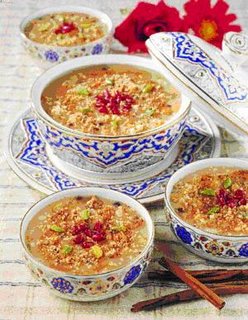2/06/2007
Noah's pudding
 I received an e-mail with an invitation for a special event, an Ashura celebration on a ship in Amsterdam, organized by the Foundation Islam & Dialogue.
I received an e-mail with an invitation for a special event, an Ashura celebration on a ship in Amsterdam, organized by the Foundation Islam & Dialogue.The invitation explained that not only Christians know the story of Noah and the Ark, but Muslims as well. The stories explain how, after the ship reached the ground, all the remaining food was gathered an put together into a single meal. Strange ingredients were found and put together: white beans, cereals, peas, apricots, raisins, oranges, nuts, etc. But the pudding that this resulted in, turned out to taste very good.
What a nice symbolic story in fact, with the prophet Noah which was “known for his tolerance, patience and dedication”. People sharing their last food with each other when the hard times of the endless rain are finally over and the signs of hope have come, with the dove with the branch in its mouth and sunshine after the rain.
The e-mail caught my attention even more because I had just been thinking of the Ark of Noah. I thought back to the fantasy story I used to dream of as a child (starting from about 8 years old). In my dream / fantasy it happened again that an enormous flood had covered my world with water. Me and my friend Pascal, who lived next door, had a big ship. It looked a bit similar to the ship of the Ashura celebration. We sailed across our village and dived deeply to save as many people as we could. And then we all lived together on that ship, as a big family / community, we had dinner together in the big living room.
It is interesting to see how my childhood fantasies are somehow connected to my present life. I think it is not for nothing that my fantasies were inspired by a prophet who wanted to help to do something for a better world, to save humans and animals who were drowning. This is what really fits for me, to the core of who I really am.
It is very difficult to explain what it means to have a heart that stretches out its arms to justice and that longs to do something to reduce poverty and injustice:
- It is not because of a feeling of guilt because of the wealth that I live in compared to the poverty in the world.
- It is not to say: “Look how good I am, that I want to help so many people, everyone should be like me”.
- It is not as a self-sacrifice, that I would find the happiness of others more important than for myself.
- It is not because I think I can make a big change for the world.
- It is not because I feel I am obliged to do it.
I mainly do it for my own happiness, if my work would not make me happy I would not do it. There were some reactions to the article in De Uitgeester of people who said they hoped I would not be disappointed in life when I would discover that I cannot change the world, that they hope I will not loose my ideals and become cynical. In “In Lucia’s eyes” from Arthur Japin, the idealist Lucia says:
In “In Lucia’s eyes” from Arthur Japin, the idealist Lucia says:
“I belief in dreams. In my childhood I lived in a world of dreams. I understand them. This doesn’t mean that I can’t see the reality. In fact I see the reality much too clearly. I protect my eyes against the bright light. I can still feel safe like this, while in the mean time I feel the sulphur burn in my nose already.”
It is not that I don’t want to look at the bright lights of suffering and injustice, which hurts my eyes. I won’t close my eyes. It is not that I deny the existence of injustice or that it doesn’t touch me. But I don’t think that seeing too much injustice will ever make me cynical, will make me give up. To see injustice doesn’t make me dream less of a better world. I can be happy with the small changes I can make, to try my best is what matters most to me.
But it does give me confidence and strength to see goodness and resistance to injustice, that is why I like to go to events like the Ashura celebration.